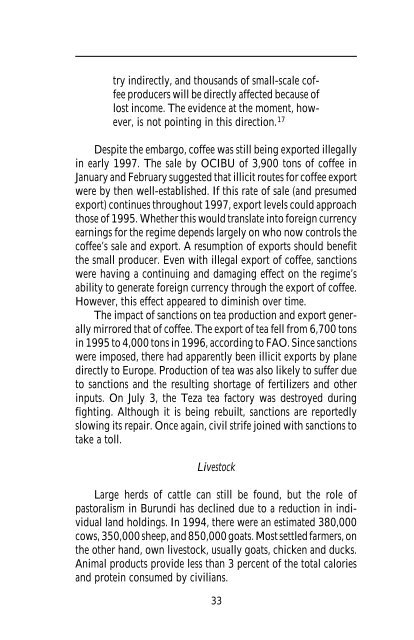The humanitarian impacts of economic sanctions on Burundi
The humanitarian impacts of economic sanctions on Burundi
The humanitarian impacts of economic sanctions on Burundi
Create successful ePaper yourself
Turn your PDF publications into a flip-book with our unique Google optimized e-Paper software.
try indirectly, and thousands <str<strong>on</strong>g>of</str<strong>on</strong>g> small-scale c<str<strong>on</strong>g>of</str<strong>on</strong>g>fee<br />
producers will be directly affected because <str<strong>on</strong>g>of</str<strong>on</strong>g><br />
lost income. <str<strong>on</strong>g>The</str<strong>on</strong>g> evidence at the moment, however,<br />
is not pointing in this directi<strong>on</strong>. 17<br />
Despite the embargo, c<str<strong>on</strong>g>of</str<strong>on</strong>g>fee was still being exported illegally<br />
in early 1997. <str<strong>on</strong>g>The</str<strong>on</strong>g> sale by OCIBU <str<strong>on</strong>g>of</str<strong>on</strong>g> 3,900 t<strong>on</strong>s <str<strong>on</strong>g>of</str<strong>on</strong>g> c<str<strong>on</strong>g>of</str<strong>on</strong>g>fee in<br />
January and February suggested that illicit routes for c<str<strong>on</strong>g>of</str<strong>on</strong>g>fee export<br />
were by then well-established. If this rate <str<strong>on</strong>g>of</str<strong>on</strong>g> sale (and presumed<br />
export) c<strong>on</strong>tinues throughout 1997, export levels could approach<br />
those <str<strong>on</strong>g>of</str<strong>on</strong>g> 1995. Whether this would translate into foreign currency<br />
earnings for the regime depends largely <strong>on</strong> who now c<strong>on</strong>trols the<br />
c<str<strong>on</strong>g>of</str<strong>on</strong>g>fee’s sale and export. A resumpti<strong>on</strong> <str<strong>on</strong>g>of</str<strong>on</strong>g> exports should benefit<br />
the small producer. Even with illegal export <str<strong>on</strong>g>of</str<strong>on</strong>g> c<str<strong>on</strong>g>of</str<strong>on</strong>g>fee, <str<strong>on</strong>g>sancti<strong>on</strong>s</str<strong>on</strong>g><br />
were having a c<strong>on</strong>tinuing and damaging effect <strong>on</strong> the regime’s<br />
ability to generate foreign currency through the export <str<strong>on</strong>g>of</str<strong>on</strong>g> c<str<strong>on</strong>g>of</str<strong>on</strong>g>fee.<br />
However, this effect appeared to diminish over time.<br />
<str<strong>on</strong>g>The</str<strong>on</strong>g> impact <str<strong>on</strong>g>of</str<strong>on</strong>g> <str<strong>on</strong>g>sancti<strong>on</strong>s</str<strong>on</strong>g> <strong>on</strong> tea producti<strong>on</strong> and export generally<br />
mirrored that <str<strong>on</strong>g>of</str<strong>on</strong>g> c<str<strong>on</strong>g>of</str<strong>on</strong>g>fee. <str<strong>on</strong>g>The</str<strong>on</strong>g> export <str<strong>on</strong>g>of</str<strong>on</strong>g> tea fell from 6,700 t<strong>on</strong>s<br />
in 1995 to 4,000 t<strong>on</strong>s in 1996, according to FAO. Since <str<strong>on</strong>g>sancti<strong>on</strong>s</str<strong>on</strong>g><br />
were imposed, there had apparently been illicit exports by plane<br />
directly to Europe. Producti<strong>on</strong> <str<strong>on</strong>g>of</str<strong>on</strong>g> tea was also likely to suffer due<br />
to <str<strong>on</strong>g>sancti<strong>on</strong>s</str<strong>on</strong>g> and the resulting shortage <str<strong>on</strong>g>of</str<strong>on</strong>g> fertilizers and other<br />
inputs. On July 3, the Teza tea factory was destroyed during<br />
fighting. Although it is being rebuilt, <str<strong>on</strong>g>sancti<strong>on</strong>s</str<strong>on</strong>g> are reportedly<br />
slowing its repair. Once again, civil strife joined with <str<strong>on</strong>g>sancti<strong>on</strong>s</str<strong>on</strong>g> to<br />
take a toll.<br />
Livestock<br />
Large herds <str<strong>on</strong>g>of</str<strong>on</strong>g> cattle can still be found, but the role <str<strong>on</strong>g>of</str<strong>on</strong>g><br />
pastoralism in <strong>Burundi</strong> has declined due to a reducti<strong>on</strong> in individual<br />
land holdings. In 1994, there were an estimated 380,000<br />
cows, 350,000 sheep, and 850,000 goats. Most settled farmers, <strong>on</strong><br />
the other hand, own livestock, usually goats, chicken and ducks.<br />
Animal products provide less than 3 percent <str<strong>on</strong>g>of</str<strong>on</strong>g> the total calories<br />
and protein c<strong>on</strong>sumed by civilians.<br />
33
















